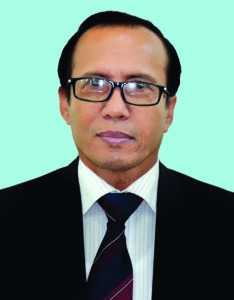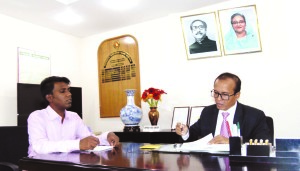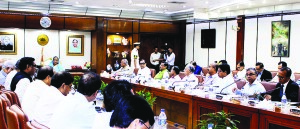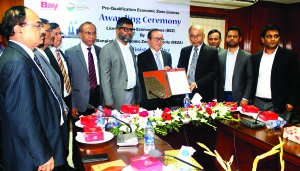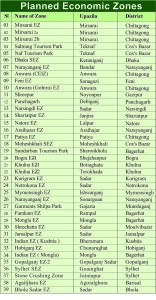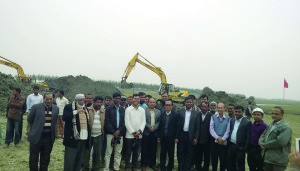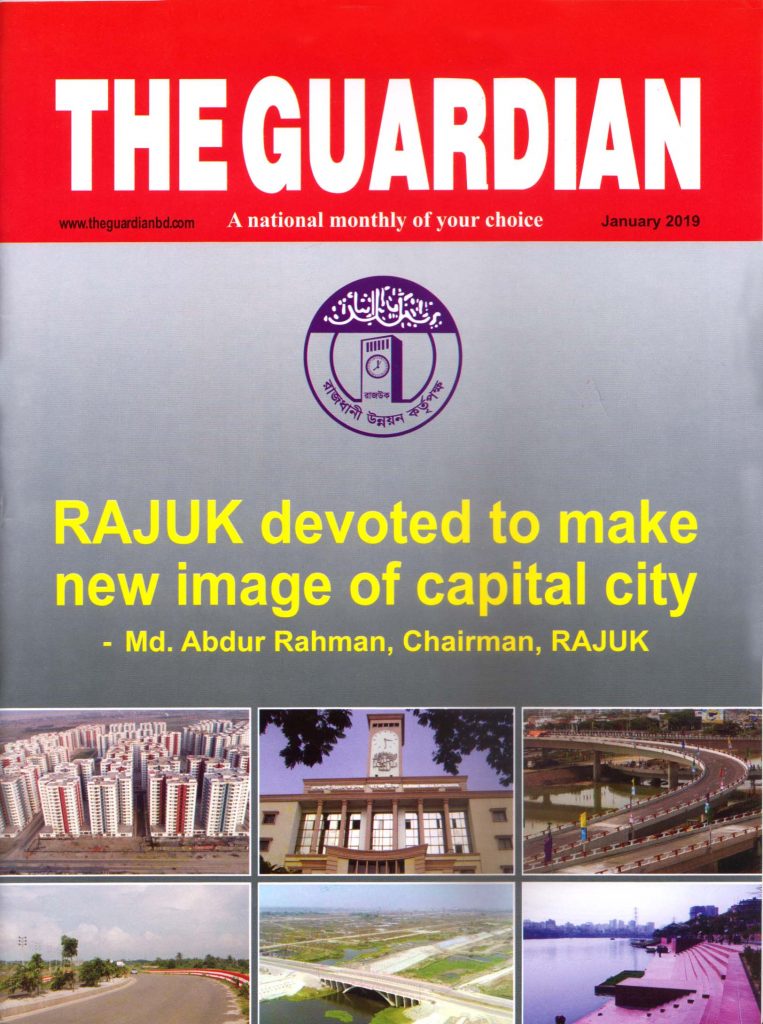Bangladesh Economic Zones Authority (BEZ) was established to facilitate development and operation of Economic Zones throughout the country, with the objective to act as a change agent for faster economic growth by creating investment friendly environment and attracting Foreign Direct Investment (FDI), said Paban Chowdhury, Executive Chairman of BEZA, in an exclusive interview with The Guardian.
The Executive Chairman, in this context, informed that BEZA has already set a target of establishing 100 Economic Zones along four corridors of the country over the next 15 years, selecting 77 sites for establishing, private, G2G and public-private EZs across the country.
BEZA encourages private sector to establish Private Economic Zones. We are devoted to offer One-Stop Services and competitive incentive package to the investors.
Terming the establishment of economic zones in Bangladesh as a groundbreaking initiative of the present government, he said that BEZA is committed to ensure inclusive economic growth in Bangladesh through providing one-stop services and competitive incentive packages to the local and foreign investors.
As a matter of fact, BEZA Chairman mentioned that Prime Minister Sheikh Hasina has taken this commendable initiative to materialize the dream of the Father of the Nation Bangabandhu Sheikh Mujibur Rahman to establish “Sonar Bangla”.
Mr. Chowdhury believes that the Economic Zones could be a major driver of economic growth and job creation and could be a major factor in lifting Bangladesh into a middle-income country status by 2021. So, on behalf of the Government of Bangladesh and as the Chief Executive of Bangladesh Economic Zones Authority, he invited national and foreign investors to invest in economic zones and share benefits of mutual growth prosperity.
He also said that they are committed to attract Foreign Direct Investment (FDI), promote export and create employment through establishment of Economic Zones and making the zones as the engine of economic growth in Bangladesh.
In an exclusive interview, he replied to several questions, covering the entire activities, problems, potentials, achievements and future plans of BEZA, focusing on the current scenario of industrial and economic developments in Bangladesh and the roles of the government behind the developments. His deliberations are quite outstanding, smart, informative and educative as well. The excerpts of his valuable interview are presented here for The Guardian readers at home and abroad:
The Guardian: Please give us a short introduction to the founding history of Bangladesh Economic Zones Authority (BEZA).
Executive Chairman: Bangladesh Economic Zones Authority was constituted under Prime Minister’s Office in August 2010, with an aim to establish economic zones in potential areas of Bangladesh for employment generation, FDI and inclusive economic growth of the country.
Bangladesh Economic Zones Act 2010 was promulgated under which Bangladesh Economic Zones Authority was established, with broad objectives to: identify and select sites for Economic Zones for industrial activities; acquire land for Economic Zones; ensure off-site infrastructure development for the Economic Zones; establish Economic Zones through Public-Private Partnership (PPP); and provide One Stop Service.
The Act provides legislations for developing economic zones of the country and powers and functions of the authority. Accordingly, in November 2010, the Government of Bangladesh established Bangladesh Economic Zones Authority (BEZA) under the Bangladesh Economic Zones Act to drive new Economic zone regime. BEZA is governed by a 3-level management structure. These are Governing Board, Executive Board, and BEZA Office.
The authority is attached with the Prime Minister’s Office (PMO) and is mandated to establish, license, operate, and control economic zones in Bangladesh. Moreover, the authority is also committed to develop backward linkage industries, creating employment opportunities and contribute to poverty reduction program.
Authority’s Vision for Industrial Development is in line with government’s long-term outlook, defined in its Vision 2021, wherein, the Government of Bangladesh has set its development targets with the objectives to achieve middle-income country threshold by 2021, provide its citizens a higher standard of living, better access to education, improved social justice, and a more equitable socio-economic environment.
BEZA is created with the objective of delivering on the industry growth target. The duties and functions of BEZA are aligned to realize the development priorities as outlaid in the Vision 2021. It is committed to provide an environment conducive to private sector participation and at the same time, ensure inclusive growth in the economy.
Industrialization is expected to play a pivotal role in achieving the above targets. Hence, government is committed to provide right policy intervention and framework to facilitate this growth and promote private participation in the economy’s growth.
The Guardian: In this context, would you discuss the background that inspires the government to establish the BEZA?
Executive Chairman: Recognizing the policy initiatives in favour of economy’s potentials and need for employment generation; the Government of Bangladesh has accelerated expansion of industrial sector. Its continuous reforms and policy efforts have resulted in structural shift in the economy, with share of industries in GDP increasing from 21 percent in 1990 to 29 percent in 2013. Premised on improved industrial production, government’s target is to achieve 10 percent annual GDP growth by 2021; with industrial sector contributing around 37% to the GDP.
The high growth agenda makes it imperative for greater fund mobilization through private sector participation. Hence, to deliver on its envisioned target the Government of Bangladesh has identified Economic Zone development as a key ingredient for driving industrialization in the country.
You know that Bangladesh has demonstrated strong economic fundamentals with a consistent GDP growth rate of 6.14 percent over last five years. This growth in GDP has been backed by increasing domestic market and a significant growth in per capita income from USD 820 in 1990 to USD 1314 in 2015.
In addition to domestic demand, low-cost labour with growing skills gives Bangladesh potential competitive advantage to attract labour-intensive industries and serve as a hub to cater export demands. Moreover, as estimated, the cost of doing business in its capital Dhaka is significantly lower than 28 major cities in Asia.
The investment fraternity Goldman Sachs included Bangladesh in the Next 11 list after BRIC countries.. Also the HSBC has been increasing its confidence in its economy’s trade potentials.
The Guardian: So far we came to know that recently Bangladesh has drawn attention of many other international organizations for economic potentials. Please mention the names of all those.
Yes, many international organizations have been attracted towards the economic potentials of Bangladesh and recognized Bangladesh. Some of the prominent ones are: 1. Goldman Sachs (with the Next-11-2007); 2. JP Morgan with the Frontier Five-2007; 3. S&P Credit Rating BB indicating long term stability; 5. Ranked 107 by Doing Business Report of World Bank- better than India which is at 134; and 6. Ranked 26th in the A. T. Kearney Global Services Location Index. Japan External Trade Organization (JETRO) in its 2014-15 survey mentioned Bangladesh as the most attractive place for Japanese investors among 19 countries of Asia and Oceania including China and India.
The Guardian: Please discuss the vision and mission of BEZA.
Executive Chairman: BEZA’s Vision is to become a sustainable development driving force and a world class investment promoter and service provider to ensure quality of life of the people.
BEZA’s mission is to persistently create value for the investors by establishing attractive investment facilities in the economic zones through One-Stop service and competitive incentive packages.
The Guardian: Would you also focus on objectives and core values of BEZA?
Executive Chairman: BEZA’s objective is to establish 100 Economic Zones on 30000 hectares of land in the next 15 years with an employment generation for 10 million people and additional export of US$40 billion.
BEZA’s core-values are set for Customer satisfaction; Team working; Free flow of information; Participation and involvement; Never stop learning; Networking; and Effective Public-Private Partnership.
The Guardian: Please discuss the main functions of BEZA.
Executive Chairman: BEZA’s main functions are as follows:
- To identify and select sites for industrial or similar sectors;
- To acquire land for economic zones identified by own initiative or PPP on behalf of the Government;
- To appoint economic zone developer on competitive basis to develop and manage the acquired land and different type of infrastructure thereof;
- To prepare infrastructure development plans of the Economic Zones;
- To allot or lease or rent of land, building or site, on competitive commercial basis in prescribed manner, to investors applied for establishing industrial units, businesses and service providers in economic zones for implementation and management of their establishment;
- To ensure infrastructure development of economic zones within specified period through monitoring of activities of its own and of economic zone developers;
- To create opportunities for employment through establishing backward linkage industries within or outside economic zones by promoting local and foreign investment including development of skilled labor force
- To ensure efficient use of land in the light of clustering principles by dividing the land based on infrastructure and on availability of local resources to provide a conducive environment and facilities within economic zones;
- To encourage more efficient management and monitor programs for implementing commitments on environment and other matters
- To take steps to establish backward linkage industries in economic zones to meet the requirements of local economy;
- To encourage business organizations to relocate polluting and unplanned industries from metropolitan cities through establishing separate economic zones for different industries;
- To encourage public-private partnership in the development and operation of economic zones;
- To take necessary steps to implement social and economic commitments;
- To establish the due rights of workers, to ensure their welfare and to establish conducive relationships between owners and workers
- To take appropriate steps to implement poverty reduction programs;
- To expedite implementation of industrial policy of the country by promoting planned industrialization of the thrust manufacturing and service sectors; and
- To convert the areas declared as economic zones into economic centers by developing industrial cities, agro-based industrial zones, trade zones and tourism zones through investment of banking sectors and to facilitate availability of skilled labor and efficient service provision.
The Guardian: Would you say what starting facilities investors are offered by BEZA?
Executive Chairman: I think you are asking for what ease of starting business available at BEZA. Yes, there are following starting facilities for investors:
- Automated registration process.
- Reduced time for obtaining trading license and to complete the tax and value added tax processing.
- Bangladesh Economy offers a most liberal FDI regime in South Asia, with no prior approval requirements or limits on equity participation and repatriation of profits and income in most sectors.
- Bangladesh enjoys duty free and quota free access to many developed economies. It has signed Treaties with 28 countries to avoid double taxation.
- Competitive incentive package for both developers and unit investors.
- Full repatriation of capital and dividend
- Tax exemption on royalties and technical fees.
- And above all One Stop Services (OSS).

5. Signing of MoU between BEZA and China Harbour Engineering Company Limited (CHEC) on development of Chinese Economic and Industrial Zone (CEIZ).
The Guardian: Would you discuss how economic zones managed by BEZA can be attractive investment opportunities for investors?
Executive Chairman: There are multiple reasons which make investment in Economic Zones managed by BEZA an attractive proposition. These are presented here categorically.
Strategic Location
Zones identified by BEZA for industrial development are strategically located in vicinity of the existing ports and airports. It supports not only in better logistics management but also in providing opportunity to leverage growing neighboring markets of China, India, Japan and other countries of ASEAN region.
Infrastructure Provision
Energy cost in Bangladesh is lowest amongst the neighboring countries. Moreover, Bangladesh also intends to provide competitive energy prices to the investors. It is poised to provide continuous quality power to industrial players at incentivized rates, embarking the plots more competitive compared to any other offered sites.
Further, for Special Economic Zones, BEZA intends to provide in-built electricity generation to cut dependence on national grid. It plans investment from domestic as well as foreign players to set-up electricity plants to ensure regular electricity supply.
Other Incentive Packages
Other than infrastructure provisions, BEZA provides multiple incentives to the developer of the Economic Zone as well as the unit investors in a particular industrial unit which includes, among others, Fiscal Benefits, such as exemption of taxes, custom/excise duties and Non-Fiscal Incentives, such as no FDI ceiling, work permits and residentship/citizenship.
The Guardian: Keeping all these in mind, would you focus on incentive package of BEZA for various investors?
Executive Chairman: BEZA has already declared attractive incentive package for both developers and unit investors which are as follows;
For Developers
- Income Tax exemption in a block of 10 years out of 15 years, with reduced tax for more 2 years;
- Exemption from custom and excise duties;
- Exemption of stamp duty and registration fees for land registration for the first time;
- Exemption of stamp duty and registration fees for land registration of loan/credit document;
- Exemption from dividend tax; and
- Exemption from Tax on Income from service charges.
For Unit Investors
- Tax Holiday for 10 years;
- Duty free import of Capital Machineries, Construction Materials and Raw Materials;
- Exemption from dividend tax after tax holiday period;
- Full repatriation of capital and dividend;
- No ceiling of FDI;
- 100% backward linkage raw-materials and accessories to sell for EOI in DTA;
- 20% sale of finished product from EPA to DTA;
- Sub-contracting with DTA allowed;
- 50% exemption of stamp duty and registration fees;
- 80% exemption of VAT on all utility services;
- Duty exemption on export;
- Exemption of Customs Duty for import of vehicles;
- Exemption of double taxation subject to Double taxation agreement;
- 50% exemption from Income Tax on Salary income for expatriates;
- Economic Zone declared as the Custom Bonded Area
- Foreign loan is permissible;
- FC Account for non-residents permissible;
- FC Account for both local and joint venture industry permissible;
- Foreign investors to be free to enter into JV;
- Tax exemption on royalties, technical fees etc.;
- Tax exemption on capital gains from transfer of shares;
- Provision of transfer of shares by foreign shareholders to local shareholders and investors;
- Issuance of work permits to foreigners is allowed up to 5% of total officers/employees of an industrial unit;
- Re-investment of remittable dividend will be treated as new foreign investment;
- Resident visa for investment of US$ 75,000 or more; and
- Citizenship for investment of US$ 500,000 or more.
The Guardian: Would you mention the category of economic zones planned to be established by BEZA?
Executive Chairman: The category of Economic Zones established by BEZA is presented here at a glance.
PP Economic Zones-established through public-private partnership (PPP) by local or foreign individuals, body or organizations:
Private Economic Zones-established individually or jointly by local, non- resident Bngladeshis foreign investor, business organizations or groups:
Government Economic Zones-established and owned by the Government;
Special Economic Zones-established privately or by public private partnership or by the Government initiative, for establishing any kind of specialized industry or commercial operations.
G2G Economic Zones-established upon initiative by the government of a foreign country or the Government of Bangladesh and Government of a foreign country; and
Economic Zones-established in collaboration with and/or partnership between Government Authorities or Organizations.
The Guardian: Would you please mention the area of priority that BEZA has selected to establish 100 economic zones across the country.
Executive Chairman: BEZA has set a target of establishing 100 Economic Zones along four corridors of the country over the next 15 years. So far, it has selected 77 sites for establishing EZs, public-private, G2G and public. The locations of selected economic zones are as follows:
Some big business groups are coming forward to set up private economic zones such as Bashundhara, City Group, Abdul Monem, Unique Group and Akij Group etc. All the government agencies are providing support for connectivity and utility services for Economic Zones. Development trend indicates that 100 Economic Zones will be developed within the planned time.
The Guardian: Would you say how Bangladesh can be optimal destination for investors?
Executive Chairman: You know Bangladesh has demonstrated strong economic fundamentals with a consistent GDP growth rate of 6 percent over last seven years and 7.05% in the fiscal year 2015-2016. This growth in GDP is supported by increasing domestic market, and a significant growth in per capita income which is US$1455 in 2016.
In addition to the domestic demand, low-cost labor with growing skills provide Bangladesh potential competitive advantage to attract labor-intensive industries and serve as a hub to cater to the export demands. Moreover, the cost of doing business in, Dhaka is considered to be one of the lowest when compared to other major cities. A study by JETRO illustrates that the cost of doing business in Bangladesh is lowest among 28 South Asian cities. The potential of the economy is acknowledged by Investment fraternity with Goldman Sachs including it in its ‘Next 11-country’ list and HSBC increasing its confidence in economy’s trade potential.
Bangladesh provides a winning combination of business-friendly environment and cost structures, thereby giving investors competitive returns.
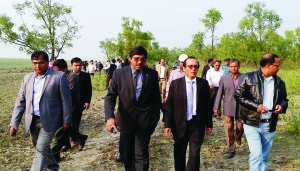
8. The Executive Chairman accompanied by his BEZA colleagues and Dr. Kamal Uddin Ahmed, Secretary, Ministry of Environment & Forest are visiting the Feni EZ site after exchanging views with the government officials of Feni on implementation of Feni Economic Zone.
Besides, the other significant factors that can cause the investors to come and invest in Bangladesh are as follows:
Consistent Economic Growth
Despite ups-and-downs in the global economy and the subsequent slump in growth, Bangladesh’s economy has been maintaining an impressive growth rate of more than 6% on average over the last 10-years and 7.05% in the fiscal year 2015-2016.
Industrious low-cost work force
Bangladesh offers a well-educated, highly adaptive and industrious workforce with economic wage level, proven by its remarkable success in RMG manufacturing and export.
Low Cost Energy
Energy prices in Bangladesh are much cheaper compared to neighboring countries.
Strategic location of Economic Zones
The locations of first economic zones of the country, has been chosen, based on regional connectivity, proximity to India, China and Bhutan; access to ports, abundance of labor force, and backward linkage opportunities.
Competitive Incentives to the Economic Zone developers and Units established in the Economic Zones
The government provided similar fiscal and financial incentives and benefits to industrial units as provided to the industrial units covered under Bangladesh Export Processing Zones Authority Act, 1980 and Bangladesh Private Export Processing Zone Act, 1996.
The Guardian: Keeping all these in mind, would you focus on the present scenario and contribution of industrial sector to the economy of Bangladesh?
Executive Chairman: Currently, the growth of Bangladesh’s economy has been driven by industrial sector growth with private sector playing the leading role. The government has taken the role of a facilitator by creating investment friendly environment, linking Bangladesh with free market economy and liberalizing trade so that private entrepreneurs can obtain opportunities of establishing and running industrial enterprises profitably. In order to foster industrialization, government has taken initiatives to set up more new industrial parks, economic zones and special economic zone.
The contribution of the industrial sector to Bangladesh economy has been on the increase. During the period 1971-80, the contribution of the broad industry sector to GDP was 11 percent and it increased to 30 percent in FY 2013-14. The growth of the industrial sector is driven by manufacturing sector particularly in textile and apparels, lather, food and beverage, pharmaceuticals, chemical etc.
In order to build a vibrant industrial sector as well as to enhance the contribution of its share to GDP from 30 percent to 40 percent by 2021, government has formulated the `National Industrial Policy, 2015′. The salient features of this policy include modernizing the economy, transforming infrastructure, diversifying economic base, enhancing productivity, mainstreaming women in the industrialization process and promoting small and medium enterprises.
The Guardian: It is learnt that BEZA is set to play role in achieving the status of Bangladesh as a middle-income country by 2021 through Vision 2021. Please say how this can be achieved.
Executive Chairman: You know to make Bangladesh a middle-income country is an important part of Vision 2021. To achieve this, BEZA has set a number of agenda. These are:
Ensuring board-based growth
- Develop 1 00 Economic Zones in the country over the next fifteen years,
- Create employment opportunities for 10 million People,
- Establish backward linkage industries in Economic Zones to meet requirements of local economy.
Addressing globalization and regional cooperation
- Attract foreign investors for development and operation of Economic Zones,
- Encourage PPP in development and operation of Economic Zones,
- Additional exports worth of USD 40 billion per year only from the Economic Zones by 2030.
Creating caring society
- Initiatives towards poverty reduction program,
- Create employment opportunities for 10 million People,
- Establishing backward linkage industries,
- Steps to implement social and economic commitments,
- Establishing social rights of workers and creating conducive employer-employee relationship.
Ensuing effective governance
- Monitoring of activities of its own and of economic zone developers to ensure infrastructure development,
- Encourage efficient management and monitor programs for implementing commitments on environment and other matters.
Mitigating impacts of climate change
- Encourage business organizations to relocate polluting and unplanned industries from metropolitan cities through establishing separate economic zones for different industries.
In addition to all these, BEZA has positioned itself to contribute in achieving the vision through regulatory reforms and facilitating support to the investors and developers.
The Guardian: In the end, please give your valuable message for all concerned about BEZA, especially for the investors.
Executive Chairman: Establi-shment of economic zones in Bangladesh is a groundbreaking initiative of the present government. Honorable Prime Minister of the People’s Republic Bangladesh Sheikh Hasina has taken this commendable initiative to materialize the dream of the Father of the Nation Bangabandhu Sheikh Mujibur Rahman to establish “Sonar Bangla”.
On behalf of the Government of Bangladesh and as the Chief Executive of Bangladesh Economic Zones Authority, I invite national and foreign investors to invest in economic zones and share benefits of mutual growth prosperity. The Economic Zones could be a major driver of economic growth and job creation and could be a major factor in lifting Bangladesh into a middle-income country status by 2021.
BEZA was established to facilitate development and operation of Economic Zones throughout the country. The main objective of BEZA is to act as a change agent for faster economic growth by creating investment friendly environment and attracting FDI. BEZA encourages private sector to establish Private Economic Zones. We are devoted to offer One-Stop Services and competitive incentive package to the investors.
We are committed to attract Foreign Direct Investment (FDI), promote export and create employment through establishment of Economic Zones and making the zones as the engine of economic growth in Bangladesh.
Profile of Paban Chowdhury
Paban Chowdhury, present Executive Chairman of Bangladesh Economic Zones Authority (BEZA), is also a full Secretary to the Government of Bangladesh. He received MBA from the Institute of Business Administration (IBA), University of Dhaka.
Prior to joining as Executive Chairman of BEZA, he worked as the Director General at Prime Minister’s Office and was closely involved in coordinating and guiding the roles of the country’s Investment Promotion Agencies (IPA’s) like Board of Investment (BOI), Bangladesh Economic Zones Authority( BEZA), Bangladesh Export Processing Zones Authority (BEPZA), Public Private Partnership Office (PPPO), including the Ministry of Public Administration, Health and Family Welfare, Social Welfare, Industry, Agriculture, Land, Food, Disaster Management, Water Resources, NGO Affairs Bureau, Bangladesh Public Service Commission, Anti-Corruption Comm-ission, Cabinet Division and Presidents Office.
Mr. Chowdhury is actively engaged in formulating regulatory, infrastructural, and industrial policies/frameworks to promote Economic Zones in the country.
Before joining Prime Minister’s Office he had worked in Bangladesh Embassy, Thailand as Charges de Affaires, Minister (Political), Counsellor (Political) and Director (Finance) at the Ministry of Foreign Affairs Dhaka. He was instrumental in policy making and implementation with regard to the financing and budgeting of the Ministry of Foreign Affairs and the Bangladesh Missions abroad.
It is also relevant to be mentioned that Bangladesh Economic Zones Authority has set the target to establish 100 Economic Zones in 30000 hectors of land by 2030. Under his leadership, within one and a half years, 68 sites have been selected for Economic Zones. Ten sites have already been inaugurated by the Prime Minister on 28th February 2016. The others are at the various stages of the development. Besides, Memorandum of Understanding (MoU) has already been signed to establish four G to G Economic Zones, one with China, one with Japan and two others with India.

